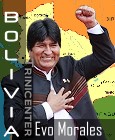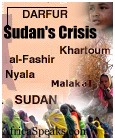Hugo Chávez's gift to Obama: Open Veins of Latin America
Eduardo Galeano's important earlier book, Open Veins of Latin America: Five Centuries of the Pillage of a Continent (1973) is crucial not only for an understanding of the economics of colonialism in America, but by extension makes explicit the mechanism of colonialism/imperialism worldwide.
"Latin America is the region of open veins. Everything, from the discovery until our times, has always been transmuted into European-or later United States-capital, and as such has accumulated in distant centers of power. Everything: the soil, its fruits and its mineral-rich depths, the people and their capacity to work and to consume, natural resources and human resources. Production methods and class structure have been successively determined from outside for each area by meshing it into the universal gearbox of capitalism. To each area has been assigned a function, always for the benefit of the foreign metropolis of the moment, and the endless chain of dependency has been endlessly extended. The chain has many more than two links. In Latin America it also includes the oppression of small countries by their larger neighbors and, within each country's frontiers, the exploitation by big cities and ports of their internal sources of food and labor. Four centuries ago sixteen of today's twenty biggest Latin American cities already existed.
For those who see history as a competition, Latin America's backwardness and poverty are merely the result of its failure. We lost; others won. But the winners happen to have won thanks to our losing: the history of Latin America's underdevelopment is, as someone has said, an integral part of the history of world capitalism's development.
Our defeat was always implicit in the victory of others; our wealth has always generated our poverty by nourishing the prosperity of others-the empires and their native overseers. In the colonial and neocolonial alchemy, gold changes into scrap metal and food into poison.
Potosi, Zacatecas, and Ouro Preto became desolate warrens of deep, empty tunnels from which the precious metals had been taken; ruin was the fate of Chile's nitrate pampas and of Amazonia's rubber forests. Northeast Brazil's sugar and Argentina's quebracho belts, and communities around oil-rich Lake Maracaibo, have become painfully aware of the mortality of wealth which nature bestows and imperialism appropriates. The rain that irrigates the centers of imperialist power drowns the vast suburbs of the system. In the same way, and symmetrically, the well-being of our dominating classes-dominating inwardly, dominated from outside-is the curse of our multitudes condemned to exist as beasts of burden." (Open Veins, 12-13)
For an African example of the same forces at work, the Congo is prime. (see King Leopold's Ghost for an excellent account of this) 8,000,000 Congolese people died in the monomaniacal Belgian greed for rubber. The horror we see in Congo today is the direct result of its rape and pillage.
It cannot be said too loudly or too often:
"In these lands we are not experiencing the primitive infancy of capitalism, but its vicious senility. Underdevelopment isn't a stage of development, but its consequence...underdevelopment arises from external development, and continues to feed it." (Open Veins, 309)
In other words, the poorest places on the planet are poorest precisely because they have made the imperialists the richest.
http://www.rootsie.com/articles/OpenVeins.html
Open veins to a new debate
Andy Johnson
Thursday, April 23rd 2009
THE Open Veins of Latin America. It is a title that has stuck with me from the day I began reading the work, in 1980, during my time at school in Toronto. I have referred to it on numerous occasions, in any discussion about books which have had an impression forming character to them. The kind of material which establishes the truth of the proclamation about not being able to put it down once you pick it up.
Full Article : trinidadexpress.com
Chávez's perfect gift to Obama
Presenting Eduardo Galeano's book, Open Veins of Latin America, to Barack Obama was a brilliant idea
Richard Gott guardian.co.uk
Monday 20 April 2009
Some surprise has been expressed in the Anglo-Saxon world that Hugo Chávez should have presented a book to Barack Obama by Eduardo Galeano. Ignorance can be the only defence, the very fault that the Venezuelan president had earlier accused his US counterpart of suffering from. For Galeano is one of the most well-known and celebrated writers in Latin America, up there with Gabriel García Márquez, and his huge output of fact and fiction, as well as his journalism, has been published all over the continent. His books have been continuously in print since the 1960s, read voraciously by successive generations.
Full Article : guardian.co.uk
|
| 






|






